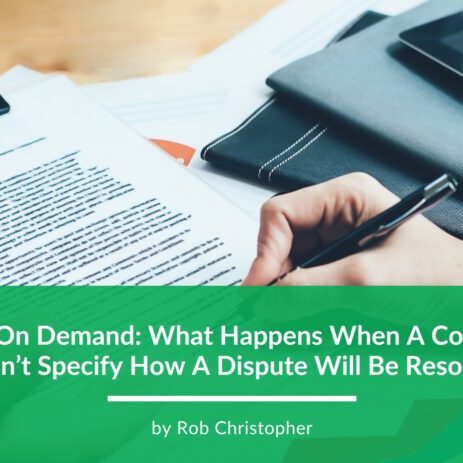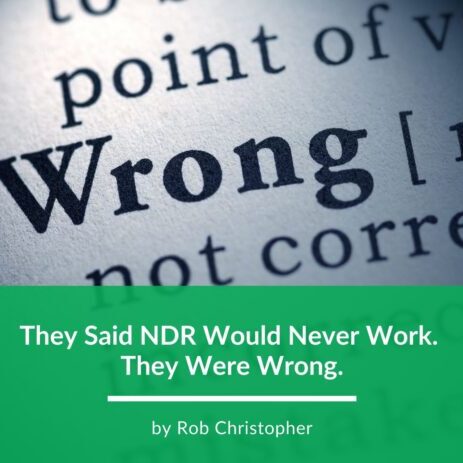Just Resolve’s NDR Process v. Lawyers and Litigation
The value of Just Resolve’s Neutral Driven Dispute Resolution (NDR) service is best illustrated by comparing the time and money required for the NDR process to lawyer-driven litigation. For limited stakes situations, the advantages of using NDR from Just Resolve stand out.
Just Resolve’s Goal is Resolution
Just Resolve focuses all parties’ attention on resolving the dispute with as little disruption and hostility as possible. Since each party to a dispute agrees in advance to be bound by the NDR process, everyone has confidence in the fairness and integrity of the result. All relevant documents and supporting material are submitted to the mutually agreed upon arbiter who is selected based on their subject matter expertise in the field from which the dispute arises.
The neutral arbiter studies the evidence and arguments submitted on both sides of the issue, conducts any independent research necessary, and issues a proposed resolution. If declined by either party, then the arbiter writes a final binding decision. No lawyers are involved. The entire process typically takes no more than six or seven weeks. And the cost shared between the parties is a fraction of what lawyers would cost.
Lawyer-driven Litigation Is Based on Continued Opposition
In the traditional process (without NDR), if a dispute arises between two business associates or trading partners, one of the aggrieved parties may call their lawyer and report the facts as they see them. The lawyer listens attentively, schedules a meeting with the client and the billable hours begin to be tallied.
Lawyers litigate, or they threaten to do so. It is the prospect of being sued and required to defend your position in a courtroom after months of trial preparation that gives the lawyer leverage over the opposing party. But when one party retains a lawyer, so must the other. Each attorney assumes a posture intended to benefit their client’s interests as they exchange demands with the threat of formal litigation looming as their “or else.”
Often, neither party concedes as they each believe they are right and due retribution. Instead, each attorney collects and analyzes any documents or data supporting their client’s position and negating that of the opposing party. More billable hours are consumed. If both parties continue to believe their claim to the money at stake is valid, and no settlement is reached, a lawsuit gets filed. The combined legal fees spent on due diligence around a simple dispute could easily exceed $10,000 or $15,000.
Instead of moving closer to a final resolution, the commencement of litigation escalates each party’s hostility toward their once valued business associate. Their mutual resentment grows as months go by with little apparent progress.
The attorneys spend more and more hours in the pretrial discovery process. Each side drafts a set of interrogatories to be answered by the other party, probing for any fact they can use to advance their cause. Both parties file formal requests for production of documents from their opponent. The attorneys can object to disclosing certain private or proprietary information and a ruling may be sought in a court hearing. Witness depositions are scheduled, requiring a stenographer and transcript costs. A videographer may be needed to record the testimony of a distant witness, or travel expenses might be incurred. All these standard litigation steps consume hours of each attorney’s time, all at the client’s expense.
What Is the Primary Incentive to Settle a Lawsuit? — Pain
Most lawsuits settle at some point before they reach the jury trial stage. The reason they resolve is because both parties have endured months or even years of mounting costs and legal fees and face the uncertainty of a verdict by a jury drawn from a pool of citizens who may have no familiarity with the litigants’ industry.
If the litigants do opt to go to trial and get a verdict, the prevailing party may think the dispute is finally resolved. Then their lawyer will remind them of the losing litigant’s right to appeal.
(Try Just Resolve’s Total Cost of Litigation Calculator (TCL) to find what a dispute would cost to litigate.)
In Limited-Stakes Disputes, Just Resolve Is Win-Win . . . Litigation can be Lose-Lose
The cost of resolving a limited-stakes dispute through lawyer-driven litigation can cost as much or more than the original dispute’s value. Involving lawyers in a dispute where $150,000 or less is at stake does not pay off as they need to conduct due diligence involving a series of tedious, time-consuming, and ultimately expensive tasks.
Just Resolve’s Neutral-Driven Dispute Resolution process eliminates the high cost of attorneys plus the frustration and anxiety which often accompanies litigation. Using NDR, the two parties to the disagreement select a neutral arbiter and move toward resolution for a fixed fee and within weeks not months. Because the process is mutual and voluntary, and the dispute is resolved by the informed judgement of a subject-matter-expert in the relevant field, neither party suffers the personal stress or operational disruption to their business.
Contact Just Resolve for a free consultation about your dispute.
Learn about Just Resolve’s wide range of services and protective tools available for your business.
More to read
NDR on Demand: What Happens When a Contract Doesn’t Specify How a Dispute Will Be Resolved?
The best way to deter threats of litigation and minimize the costs, duration, and distractions of resolving any dispute is to put a dispute resolution clause specifying NDR — Neutral-Driven Resolution — in all your contracts BEFORE there is a problem. That means that if a dispute should arise between a business and a contractor,…
They Said NDR Would Never Work. They Were Wrong.
Many people are surprised by how effective NDR can be. Since publishing my book and speaking at events about NDR (Neutral-Driven Resolution), I’ve often been asked a simple question: Does it work? And if it really does lower the costs and the time it takes to settle common disputes, why doesn’t everybody know about…
“Morgan Hill author releases new book”
The Morgan Hill Times featured Rob’s new book in an article ahead of his “Meet the Author” night at Booksmart. “Legal disputes and conflicts cost businesses billions of dollars a year in lawyers’ fees, lost productivity, time and aggravation. A new book by Morgan Hill author Robert Christopher proposes an innovative, faster and simpler way…
Not All Disputes are Equal
Not all business and legal disputes are alike, and not all of them can be resolved in the same way. In writing my book Just Right: How Neutral-Driven Resolution Can Close the Gap in American Civil Justice, it was important to distinguish the types of common disputes for which NDR is most suitable. As readers…



